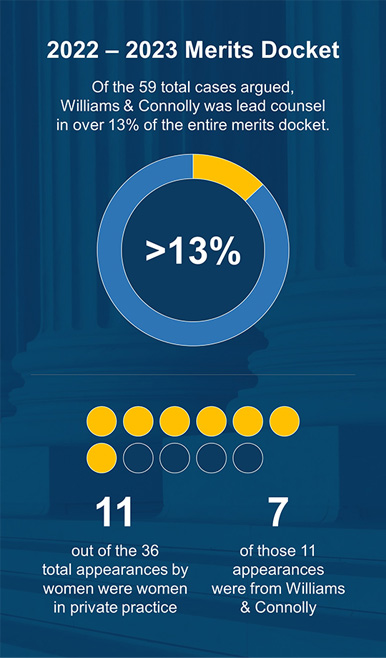During the 2022-23 U.S. Supreme Court Term, Williams & Connolly’s Supreme Court and Appellate Litigation practice was lead counsel in eight merits cases and argued seven cases—a record for any group in private practice, comprising more than 13% of the Court’s entire merits docket.
In addition, the Williams & Connolly team made up the majority of women advocates in private practice before the Court this Term, arguing 7 of the 11 cases argued by private practice women advocates. Historically, a vast majority of arguments before the Court have been made by men. For example, out of 75 total appearances from advocates in private practice this Term, 14.7% were women and 85.3% were men.
Lisa Blatt, chair of the Supreme Court and Appellate Litigation practice, argued four cases before the Court this Term: Andy Warhol Foundation for the Visual Arts, Inc. v. Goldsmith, a closely-followed copyright case involving the “transformative use” doctrine; Gonzalez v. Google, concerning the scope of immunity for interactive computer services under the Communications Decency Act; Jack Daniel’s Properties Inc. v. VIP Products LLC, where the question presented was whether a defendant’s “humorous” or “expressive” use of another’s trademark insulates the defendant from liability for infringing or diluting the trademark; and Turkiye Halk Bankasi A.S. v. United States, concerning whether U.S. district courts may exercise subject-matter jurisdiction over criminal prosecutions against foreign sovereigns and their instrumentalities.
Sarah Harris argued two cases this Term: Financial Oversight Board v. CPI, which involved the Board’s immunity from federal suits under the Puerto Rico Oversight, Management and Economic Stability Act; and Bartenwerfer v. Buckley, where the question presented was whether a bankruptcy debtor can discharge debts arising from someone else’s fraud.
Amy Saharia argued one case this Term: Dupree v. Younger, where the question presented was whether purely legal issues decided at the summary judgment stage must be raised in post-trial motions to be preserved for appeal.





